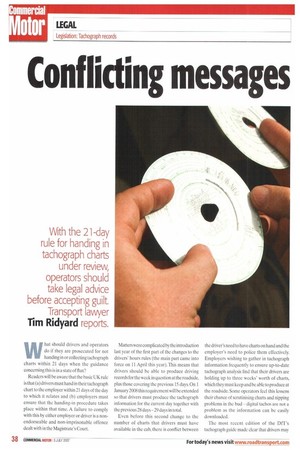Confliding messages
Page 42

Page 43

If you've noticed an error in this article please click here to report it so we can fix it.
What should drivers and operators do if they are prosecuted for not handing in or collecting tachograph charts within 21 days when the guidance concerning this is in a state of flux?
Readers will be aware that the basic UK rule is that (a) drivers must hand in their tachograph chart to the employer within 21 days of the day to which it relates and (b) employers must ensure that the handing-in procedure takes place within that time. A failure to comply with this by either employer or driver is a nonendorseable and non-imprisonable offence dealt with in the Magistrate's Court. Matterswere complicated by the introduction last year of the first part of the changes to the drivers' hours rules (the main part came into force on 11 April this year). This means that drivers should be able to produce driving records for the week in question at the roadside, plus those covering the previous 15 days. On 1 January 2008 this requirement will be extended so that drivers must produce the tachograph information for the current day together with the previous 28 days— 29 days in total.
Even before this second change to the number of charts that drivers must have available in the cab, there is conflict between the driver's need to have charts on hand and the employer's need to police them effectively. Employers wishing to gather in tachograph information frequently to ensure up-to-date tachograph analysis find that their drivers are holding up to three weeks' worth of charts, which they must keep and be able to produce at the roadside. Some operators feel this lessens their chance of scrutinising charts and nipping problems in the bud — digital tachos are not a problem as the information can be easily downloaded.
The most recent edition of the DfT's tachograph guide made clear that drivers may keep their tachograph charts for up to 30 days and employers will not be required to take them in before that time has elapsed.
However, this indication from the D1T may not have filtered down to police ollieers/Vosa examiners, who may decide to prosecute operators and drivers for failing to comply with the 21-day rule. A recent case highlighted the ignorance of the Crown Prosecution Service (CPS) and the police regarding this issue. The defendant's lawyer had to write to the CPS highlighting this developing law, pointing out !hat it was unfair to pursue strict obedience of the 21-day rule when EU regulations conflict with the UK rules and that the DIT guidance suggests relaxation of the 21-day rule.
Seek legal advice Any operator or driver prosecuted for failure to hand in or collect tachograph records within the 21-day period should seek legal advice, particularly if they have complied with the 30-day guidelines. It may be regarded as an abuse of the court process to prosecute operators or drivers for failure to comply with the 21-day rule when specific guidance to the contrary is in the public domain, published by the DfT.
Interestingly, the proposed penalty for a driver failing to hand in charts to an employer within 21 days is a verbal warning, not prosecution. The Department for Transport (DM opened a consultation on 7 June to look at these proposed fixed penalties and roadside deposits.
It is believed the DfT will, before too long, publish draft regulations under which drivers may not need to hand in tachograph records for possibly up to 35 days. Nor will employers be under a legal obligation to have them handed in before that time — although they may want to collect them more frequently to make their policing of tachograph records more effective.
To be absolutely safe, operators may want to stick to the 21-day rule for the moment. However, if you work to a 30-day system and find yourself facing a prosecution, get legal advice and do not feel pressured to plead guilty.There is a possible defence here, albeit one that would need to be argued in court.
The DfT's indication that a verbal warning would suffice for failing to hand in charts within 21 days should be pointed out to Vosa.the police and the CPS — you may find that this sees any case against you dropped.






























































































































































































